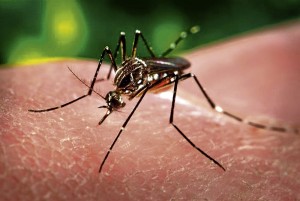Seventy years after it was first identified, we are still fighting dengue, a deadly mosquito-borne virus that is still spreading around the world to an alarming extent. But a victory over the disease previously known as “breakbone fever,” owing to the excruciating muscle and joint pain inflicted, may be in sight.
Recently, French pharmaceutical company Sanofi announced that its experimental vaccine for dengue fever—involving more than 10,000 children in Southeast Asia—had succeeded in its first late-stage clinical trial.
The vaccine reduced the incidence of dengue fever by 56 percent in a “Phase 3” trial that involved 10,275 children aged 2 to 14 in Indonesia, Malaysia, the Philippines, Thailand and Vietnam. Two-thirds received three injections of the vaccine over one year. The other one-third received three injections of placebo.
The results could help pave the way for the introduction of the first vaccine to prevent a disease that causes severe flu-like symptoms, but can develop into potentially deadly hemorrhagic fever.
The vaccine is sorely needed considering that estimated incidence of dengue has increased 30-fold over the past 50 years with 50-million dengue infections now occurring worldwide each year. Here in the Philippines, dengue is regarded as a major public health problem. In 2013, the country reported 187,031 dengue cases and 591 deaths.
First time
“This is the first time ever a dengue vaccine successfully completed a Phase 3 efficacy study,” said Dr. Ma. Rosario Capeding, principal investigator, Research Institute for Tropical Medicine. “These significant clinical results, associated with the good safety profile of the vaccine, bring real hope to more than 100 million people affected each year by dengue, a disease without any specific treatment today.”
As part of the Phase 3 trial, Sanofi conducted the clinical study in two areas in the Philippines, namely, Barangay Guadalupe in Cebu City, and San Pablo in Laguna wherein a total of 3,500 Filipinos between 2 and 14 years old were tested with the vaccine.
Capeding added that the results of this first large-scale efficacy study will be further complemented by the result coming from Latin America (involving more than 20,000 volunteers from Brazil, Colombia, Honduras, Mexico and Puerto Rico), which is due to be released on the third quarter of this year.
Achievement
Sanofi Pasteur president and CEO Olivier Charmeil declared in a statement: “This achievement is the result of more than 20 years of work in the field of dengue, collaborating with investigators, volunteers, authorities, scientific experts and international organizations. Our goal is to make dengue the next vaccine-preventable disease and to support the World Health Organization’s ambition to reduce dengue mortality by 50 percent and morbidity by 25 percent by 2020.”
Despite decades of effort by many scientists to develop a vaccine for dengue, no licensed vaccine has become available. This is because dengue has four strains (a fifth one was recently discovered in Malaysia, although scientists are playing down the risk to humans of this particular strain) and while some can be vaccinated against, so far protection from all of them has proved elusive.
“Infection with one type of the virus produces life-long immunity but only to that particular strain. Infection with another strain of dengue virus increases the chance of developing dengue hemorrhagic fever or dengue shock syndrome, both serious and potentially deadly diseases. Typically, an epidemic caused by one dengue strain is followed a few years later by an epidemic caused by one of the remaining three strains,” explained Sanofi Pasteur Philippines country manager Ching Santos.
Health Assistant Secretary Eric Tayag said that despite a low number of cases recorded from Jan. 1 to March 29 (15,374 versus 31,407 cases recorded on the same period last year), Filipinos should not feel complacent because the mosquitoes that could carry the virus could still breed in shallow parts of the river or other stagnant bodies of water. Cases could rise anytime.
Tayag explained that dengue exacts its greatest toll among young children, those with underlying health issues or those do not seek proper medical treatment. Financially, the country lost an estimated P367 billion due to illness resulting from dengue (average cost of diagnosis per patient is P5,050 while average therapeutic management for dengue is about P4,387).
